Saying the University of Rhode Island always felt like home is probably an understatement for Joseph Confessore, ’25. Not only is he from just a town over in North Kingstown, but he attended alongside his twin sister, Mia, both carrying on the legacy of URI graduates in his family that started with his great-grandfather in the early 1940s.
When it came to choosing URI, however, he had to consider all the factors. “As a child, I was always touching and taking objects apart. Since then, I’ve had a passion for understanding how things work, and that, combined with my fascination for the human body, led me to major in biomedical engineering,” said Confessore. “I came to realize that engineers, who integrate medicine into technological innovations, are helping to transform lives, bridging science and humanity.”
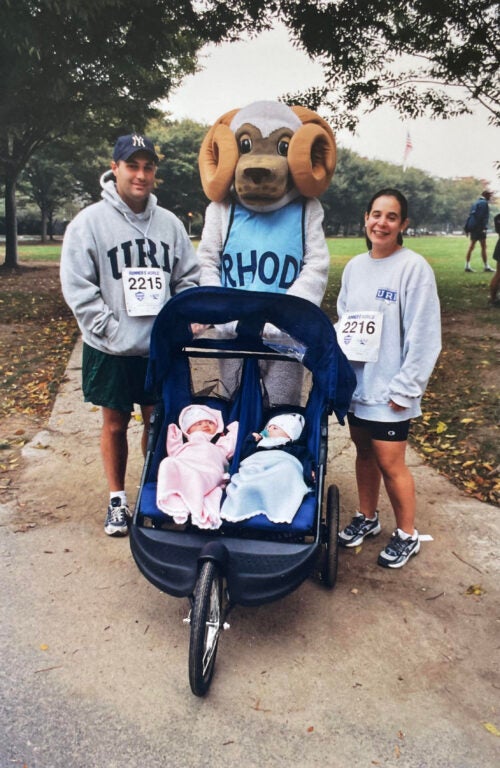
“The amazing Fascitelli Center for Advanced Engineering, with all the latest technology, couldn’t even compare to any of the other schools I toured,” said Confessore. “During my tour, I immediately noticed students working hands-on and collaboratively in the classrooms, designing tomorrow’s innovations. I was intrigued by the students’ capstone projects on display, which had direct real-world application.”
With that in mind, he began touring universities to pursue biomedical engineering. Adjacent to the Fascitelli Center, he found several state-of-the-art, newly built, science and technology buildings, which would allow him to pursue minors in mathematics, chemistry, and cell and molecular biology. Just steps beyond this, students from varying majors gathered for events on the main quad, developing a community based on connection and shared experiences. In his pursuit of engineering and medicine, he knew URI was the best place for him to make that happen.
“URI is a large state school. However, it has a unique way of making a large school feel small and personal. During my time here, it was not uncommon to know professors on a personal level. Through this, I was able to excel in my learning and engage with the university in a different way,” said Confessore.
Through many of URI’s programs, graduate-level office hours are offered to support undergraduate courses. For example, he frequently went to the Beaupre Center for Chemical and Forensic Sciences to gain support in organic and general chemistry. Through this, he met his graduate lab teaching assistant, who later became his research mentor. Confessore has minors in mathematics, chemistry, and cell and molecular biology.
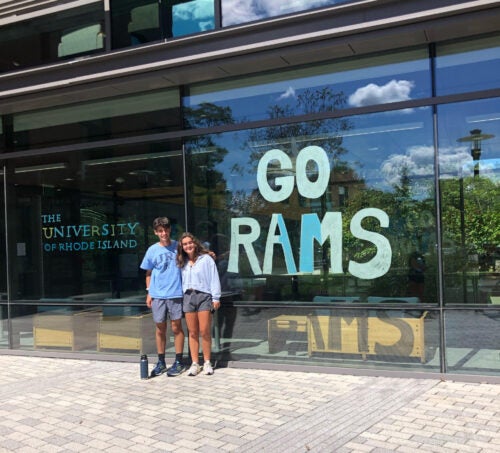
This year’s graduating biomedical engineering class is made up of 22 students. “I was able to make lifelong connections with peers and professors that I know will last long after graduation,” said Confessore. Additionally, URI was conveniently located for him to pursue interests outside of school. Before class, he would run and then swim laps at the beach with friends. During the colder months, he enjoyed cross-country skiing at some local parks and even had enough snow to cross-country ski right on-campus.
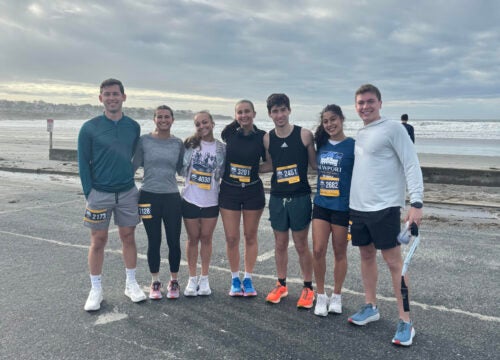
His research group received funding for a project focused on measuring bedsores or pressure injuries in the geriatric population. The device used pressure-gauge sensors to track and alert nursing staff to the risk of developing bedsores. They went on to present and publish a technical paper through the Massachusetts Institute of Technology Undergraduate Research Technology Conference.
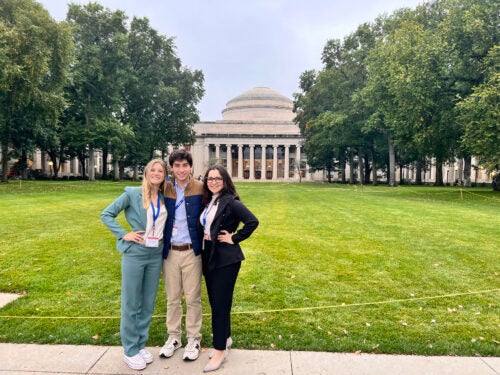
prevent pressure injuries in geriatric population. Olivia Wojnilo (left), Joseph
Confessore, Arianne Parvaresh-Rizi.
Confessore also assisted in research on small molecule cysteine arylation using pyridinium salts in Professor Fang Wang’s medical chemistry research lab. They aimed to understand the reactivity of compounds compared to platinum-based anticancer agents.
Confessore successfully completed multiple internships as an undergraduate. He worked in the orthopedic department for bioengineering at Brown University on a pediatric device for children with cerebral palsy. The device was designed to measure pressure while completing tasks monitored throughout a physical therapy appointment. From the same lab, he began supporting clinical studies for a device that measures rotator cuff tears and assesses a patient’s proprioception both pre- and post-operatively.
He also worked at several hospitals for Brown Emergency Medicine in Providence, ranging from Level 1 trauma centers to community hospitals. “This has been an exceptional experience, providing the opportunity to learn medical terminology, a fast-paced environment, and expand my knowledge beyond the classroom, while beginning to apply it in a real-world setting,” said Confessore.
This led to working at Boston Children’s Hospital with the cardiac surgery group, measuring the dimensions of artificial models of pulmonary artery pressure and flow. Additionally, he supported a study on aortic valve dimensions in pre- and postoperative pediatric congenital heart defects. “By far, this has been the most transformative experience I’ve had. I was able to go into the operating room, where I supported in collecting tissue samples, dissecting regions like the cardiac annulus, and testing the biaxial stress-strain properties of the material elements,” said Confessore. “I worked alongside a team of physicians and engineers, and through this, I realized that this is the future I want to be a part of.”
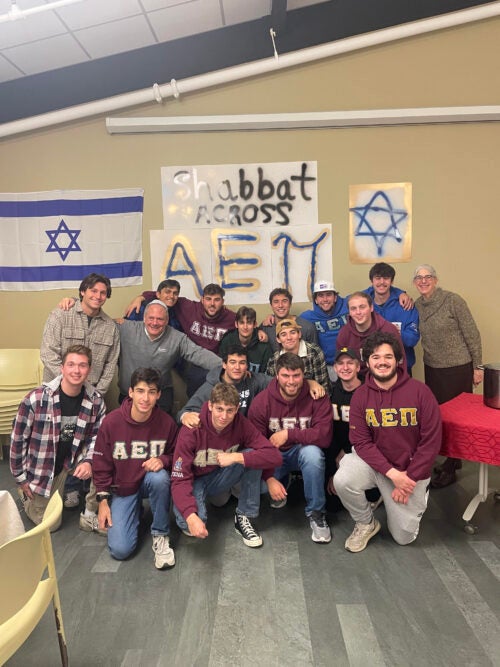
Confessore is now on a pre-med track, continuing to work in the emergency room and supporting 3D modeling for Boston Children’s Hospital’s cardiac surgery research. “My goal is to apply to medical school, and one day work in academic medicine,” said Confessore.
Awards and Accomplishments
- Summa Cum Laude
- Tau Beta Pi (Engineering Honor Society)
- Order of Omega (Leadership Greek Honor Society)
- Phi Kappa Phi (URI Multidisciplinary Honor Society)
- University of Rhode Island Honors Program
- Dean’s List all semesters at URI
- RI Biomedical SURF-INBRE Symposium
- MIT technical paper publication and presentation
- 2022 URI^2 Grant Recipient: Clinical study and assembly
